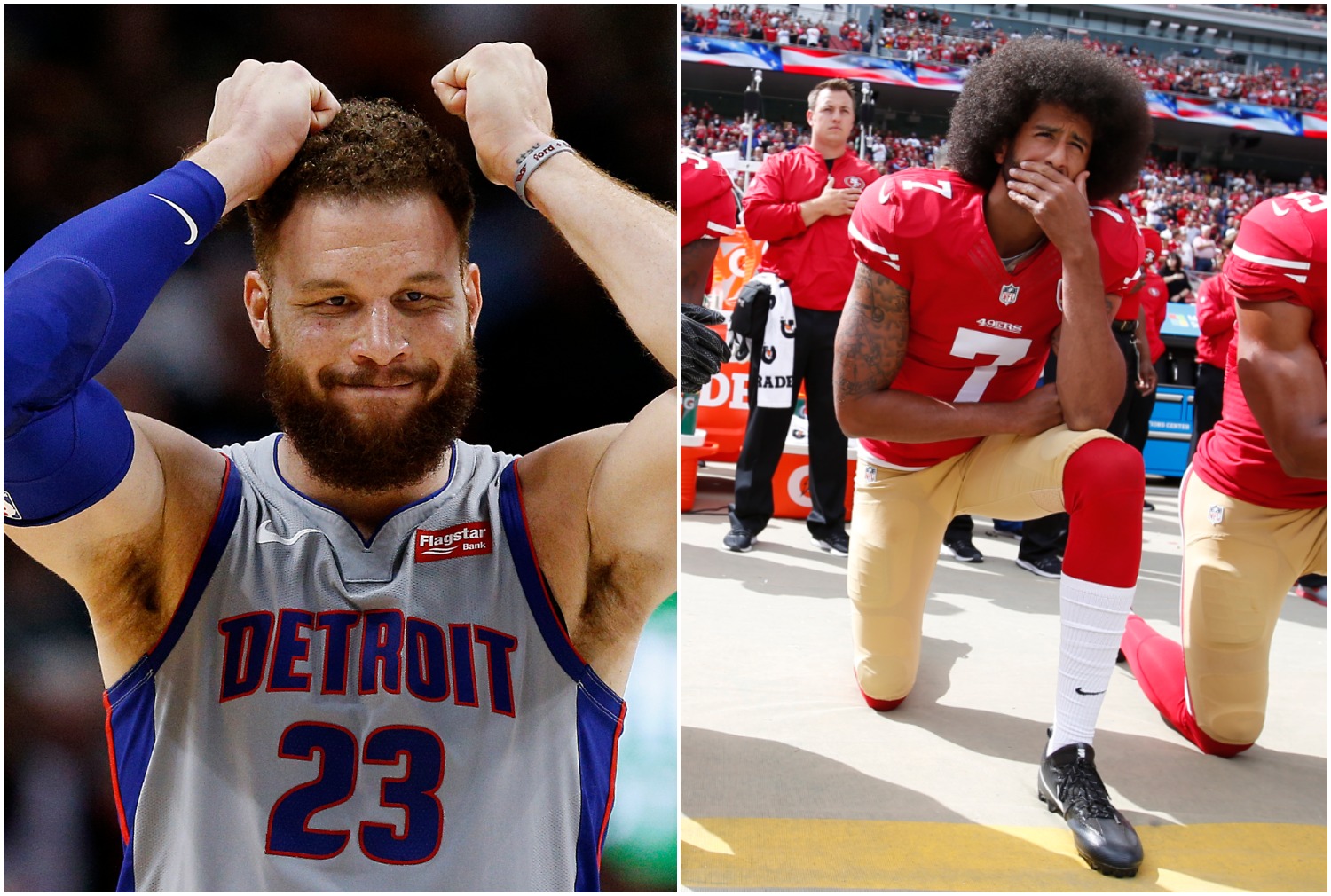NBA
Colin Kaepernick and Blake Griffin Couldn’t Escape Childhood Racism

Blake Griffin and Colin Kaepernick play different sports. They grew up in drastically different parts of the United States. And they certainly don’t boast the same body type. What they do have in common, though, is a tough childhood that included battles with racism. That’s the price they paid for growing up in households where they didn’t exactly look like their parents.
Colin Kaepernick experienced racism growing up in California
RELATED: Colin Kaepernick Will Join Board of Directors at Company Run By Former Twitter CEO
Long before he became the face of social justice, Colin Kaepernick endured his own experiences with racism. Of course, a lot of that had to do with growing up as the biracial son of white parents. Kaepernick’s biological mother, Heidi Russo, gave birth to her son at the age of 19. However, she made the selfless decision to place him up for adoption.
After caring for Colin for five weeks, she picked Teresa and Rick Kaepernick to be his parents. While that gave the newborn a loving, financially-supportive home, it also brought about issues in the future.
The family relocated to California—one of the most culturally diverse states in the country. Yet, Kaepernick and his family still heard plenty of racially-charged comments, according to Mercury News.
“When adults were unaware of who my mother was at Little League Baseball games, it was her that gave a tongue-lashing to the parents in the stands speaking ill about the black child striking out all of their sons,” he said.
Given his biracial background, Colin Kaepernick didn’t look anything like his adopted parents. Ultimately, he and his family showed tremendous character in overcoming racist remarks from judgemental peers. Unfortunately, Blake Griffin experienced a similar upbringing as a biracial child.
Blake Griffin faced racism in high school for being biracial
RELATED: Michael Jordan Will Donate $100 Million to Join Colin Kaepernick in Fighting for What’s Right
Like Colin Kaepernick, Griffin comes from a biracial background. His mother, Gail Griffin, is white. His father, Tommy Griffin, is Black. Growing up in Oklahoma, that led to plenty of racially-insensitive remarks aimed at the budding basketball star.
The Detroit Pistons forward recently spoke about his experiences with racism in high school on the Armchair Expert with Dax Shepard podcast. Let’s just say that Griffin faced quite a few challenges as a teenager (H/T EOnline).
“They had their fair share of nasty looks, of comments, of remarks,” Griffin explained. “It’s still happening today, so you can imagine what it was like 30 years ago.”
More specifically, Griffin brought up a situation that he has since realized was incredibly racist. He remarked that girls in high school told him they would never date because their fathers wouldn’t allow it. Years later, Griffin now sees the troubling truth behind that statement.
“Now, I think, ‘Man, that’s super f–ked up,'” Griffin said. “But at the time, I was just like ‘Yeah, all right’….which is crazy to me.”
Griffin dealt with racism with the Clippers
For Blake Griffin, the issue of racism reared its ugly head even when he got to the NBA. Except nobody could have predicted that the incident would change the landscape of the NBA in such a major way.
In 2014, Los Angeles Clippers owner Donald Sterling found himself in hot water after TMZ Sports released an audiotape of a conversation between Sterling and his mistress.
On the recording, he says, “It bothers me a lot that you want to broadcast that you’re associated with black people. Do you have to?”
He followed up with, “You can sleep with [black people]. You can bring them in, you can do whatever you want. The little I ask you is not to promote it on that…and not to bring them to my games.”
But the remark Sterling caught the most flak for from the NBA involved his own players. When referring to the Clippers players, he said, “I support them and give them food, and clothes, and cars, and houses. Who gives it to them? Does someone else give it to them?”
Sterling immediately became the NBA’s biggest villain. Clippers players even considered boycotting the team’s Game 4 playoff matchup against the Golden State Warriors. Ultimately, NBA commissioner Adam Silver banned Sterling from the NBA for life and fined him $2.5 million. He later sold the franchise for $2 billion.
Griffin displayed admirable maturity and leadership by sticking through the ownership change. Unfortunately, injuries significantly hampered his play. In 2018, the Clippers traded him to the Pistons.
And while his days as a star may be gone, Blake Griffin still stands tall as one of the top role models in the NBA. And like Colin Kaepernick, he overcame racism for something he had no control over.











